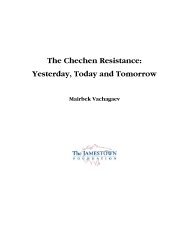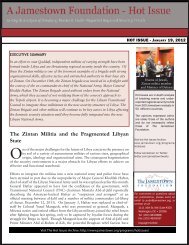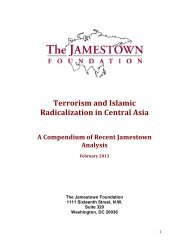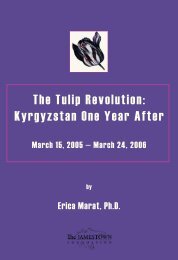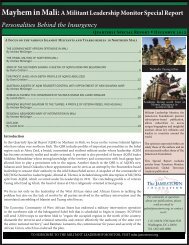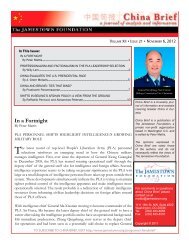By Brian Glyn Williams - The Jamestown Foundation
By Brian Glyn Williams - The Jamestown Foundation
By Brian Glyn Williams - The Jamestown Foundation
Create successful ePaper yourself
Turn your PDF publications into a flip-book with our unique Google optimized e-Paper software.
claims that the Tatars were usually given freedom to act independently against their traditional enemies. 62 <strong>The</strong><br />
Khan's independent raids were of great assistance to the Ottomans and one raid in particular, against<br />
the Zaporozhian Cossacks, prevented this host from participating in a crusade against the Turks<br />
organized in 1594. 63<br />
<strong>By</strong> the end of the seventeenth century, the threat of Cossack raids had begun to diminish as the Russian<br />
government began to strengthen its control over the various hosts and put an end to their independent<br />
activities. <strong>The</strong> Cossacks, however, found plenty of use for their martial skills in Russia's armies which soon<br />
proved to be more of threat to the Turco-Tatar alliance than the Cossacks had ever been. <strong>The</strong> Russians<br />
had gained a fair amount of control over their southern borders by the late seventeenth century and,<br />
although the Tatars did continue to make slave raids into Russian territory as late as the reign of Catherine the<br />
Great, the days of the great slave raids had most definitely come to a close.<br />
<strong>By</strong> establishing forts at strategic locations, elaborate patrol patterns, wooden palisades, improved alarm<br />
systems and Cossack defense units, the Russians could finally say that they had begun to gain sufficient control<br />
of their southern borders to prevent the Tatars from moving freely through Russian territory on their<br />
own missions, or at the bidding of the Sultan. <strong>By</strong> the end of the century, the Russians were actually able to<br />
move out on to the steppe and bring war to the Tatars' own doorstep.<br />
During the reign of Peter the Great, two Russian armies attempted to move out across the steppe and strike<br />
directly at the Khanate. In the first invasion, a Russian army of 100,000 men found the way to the Crimea<br />
blocked by steppe fires set by the Khan's riders and was forced to retreat, losing 45,000 men in the process. 64 A<br />
second attempt succeeded in reaching the Crimea and defeating a Tatar force but it too was forced to<br />
retreat for want of supplies.<br />
<strong>The</strong> Crimean leaders could not but have noticed that the Khanate had been saved on both occasions by<br />
the harsh conditions of the steppe as much as their own martial abilities. Although the Khanate<br />
emerged relatively unscathed from both encounters, a strong warning had been sent to the Crimean<br />
Tatars. If she so wanted, Russia could carry the war to the Tatars in a way previously unimagined.<br />
In 1696, the most telling sign of the Tatars' declining military superiority occurred. Peter the Great<br />
succeeded in conquering the Ottoman fortress of Azov and, in the process, separating the Crimean<br />
Khanate from its possessions on the Taman peninsula in the Caucasus. According to Henry Howorth, Peter<br />
would have conquered Azov in an attack during the previous year if a Tatar contingent, under Kaplan<br />
Giray, had not successfully stormed the Russians' entrenchments and defeated Peter's forces. 65<br />
<strong>The</strong> loss of Azov was only a temporary setback and, in the Pruth Campaign of 1711, the Crimean Khan,<br />
Devlet Giray III, joined the Ottomans in defeating a Russian invasion force in Moldavia. This disastrous<br />
invasion was launched with the aim freeing Moldavia from Turkish rule. <strong>The</strong> Russians were initially<br />
successful and, with Moldavian assistance, they were able to move deep into Ottoman territory meeting little<br />
resistance.<br />
In May, however, an Ottoman army lead by the Grand Vezir Baltajai Mehemed Pasha stumbled into<br />
the Russian force and heavy fighting commenced. Massie claims that the Grand Vezir lost his courage<br />
during this fighting and would have withdrawn from the battle at an early stage had the Crimean Khan not<br />
steadied his nerves. 66 His encouragement paid off and, in the ensuing struggle, the Russians were defeated<br />
and forced to retreat to Jassy, the Moldavian capital.<br />
18



